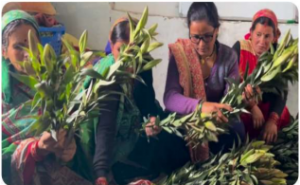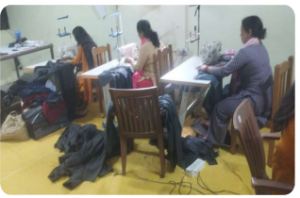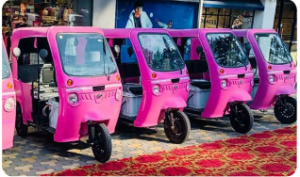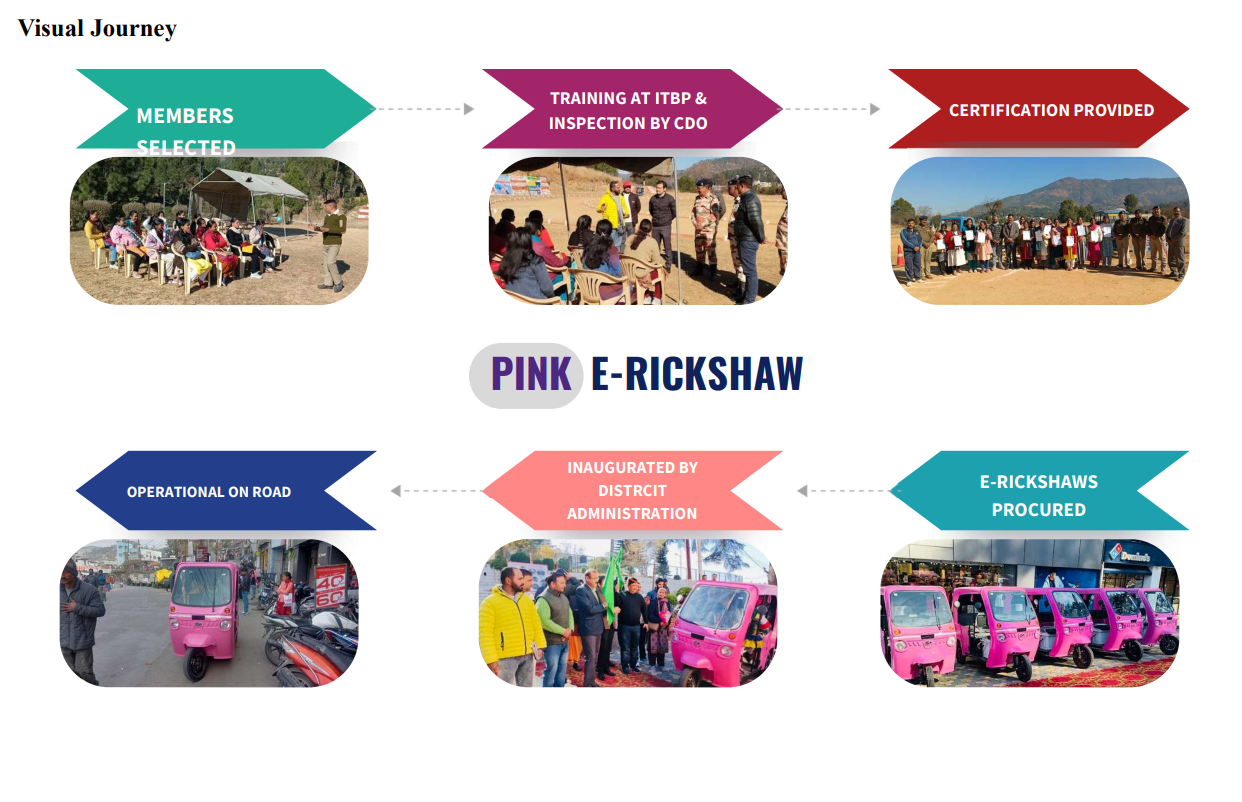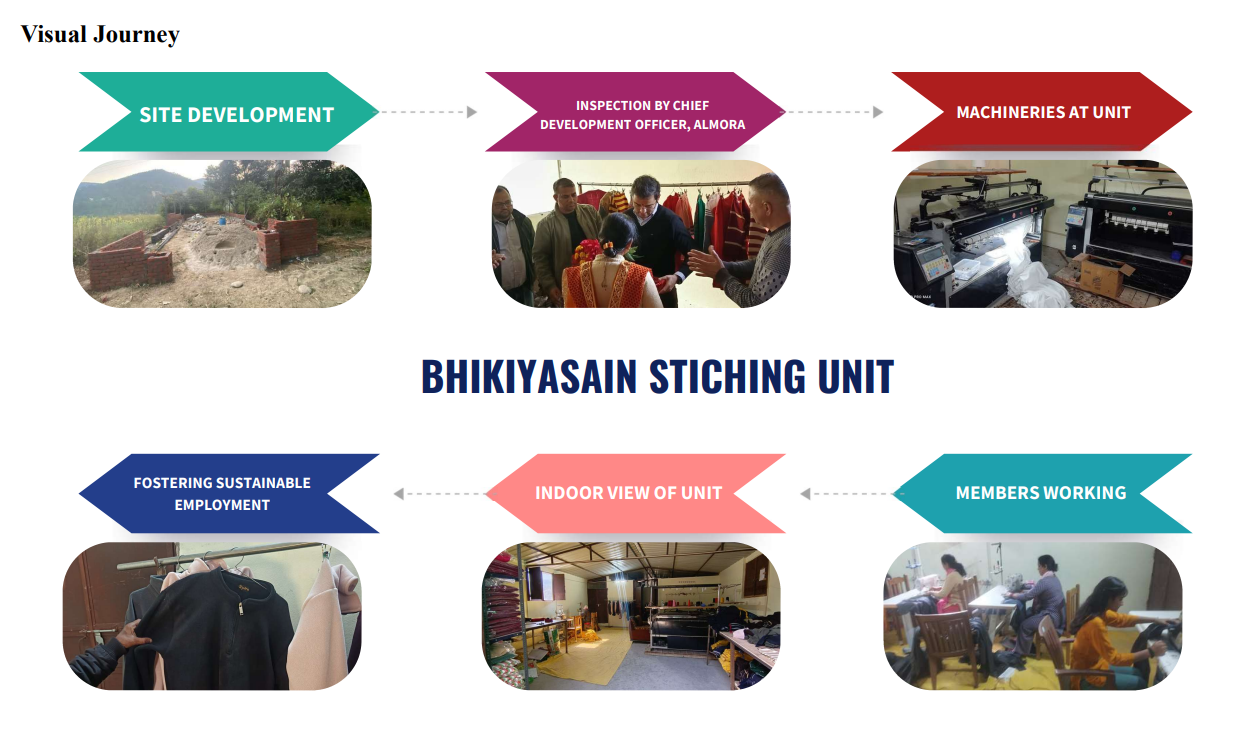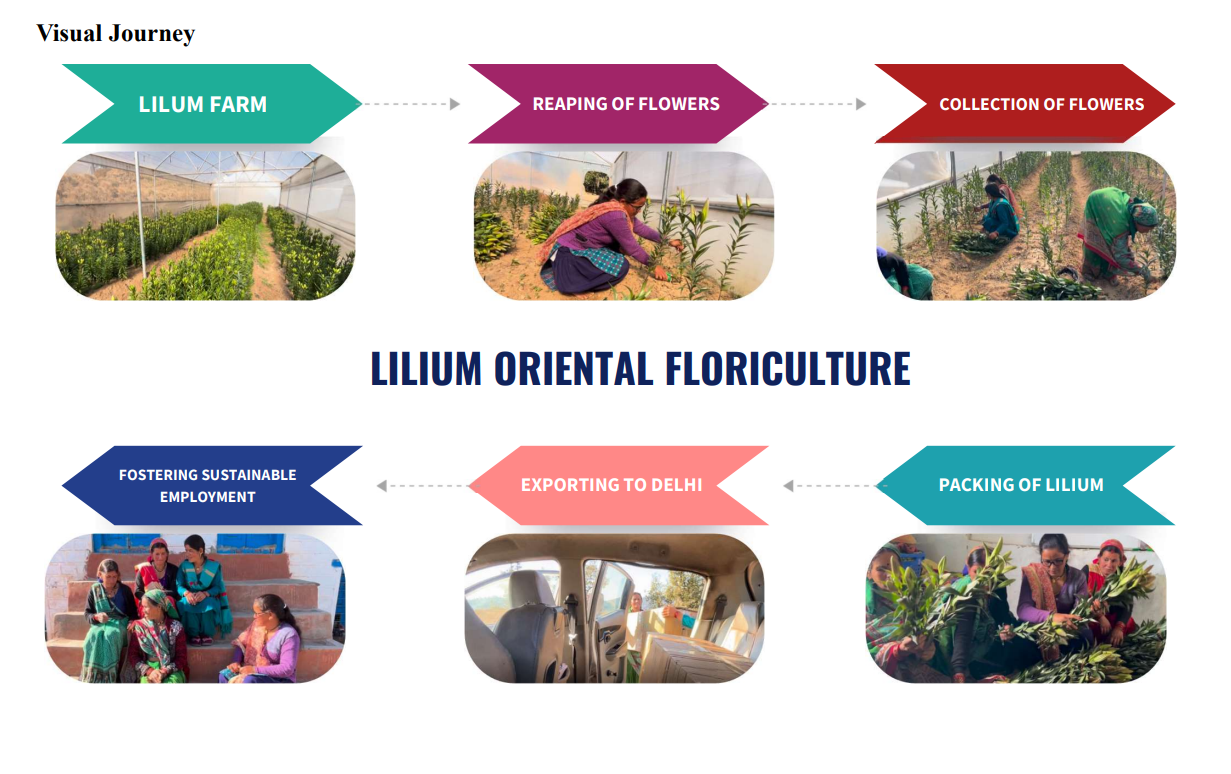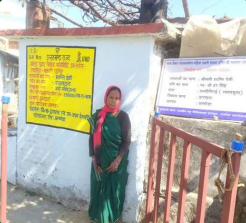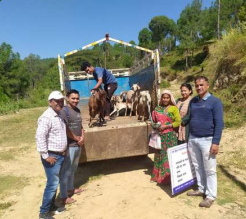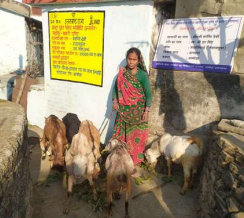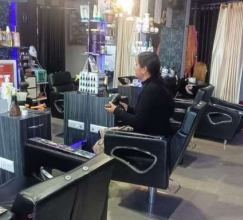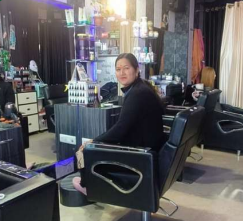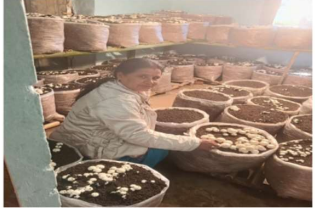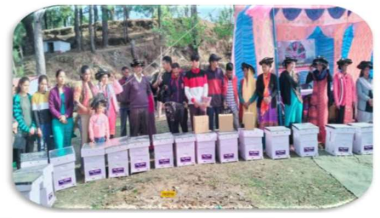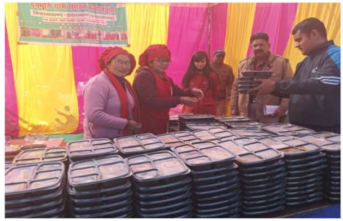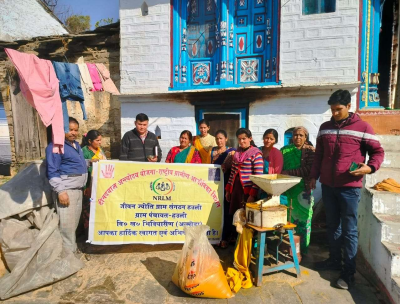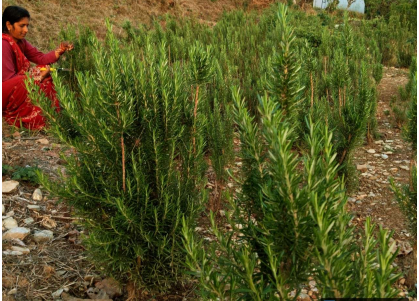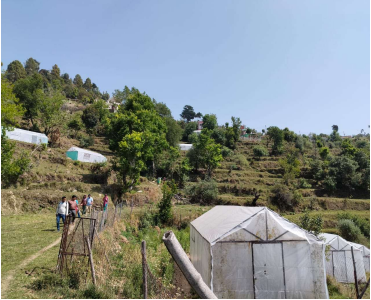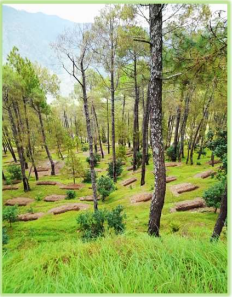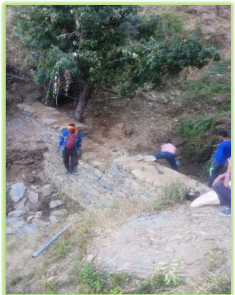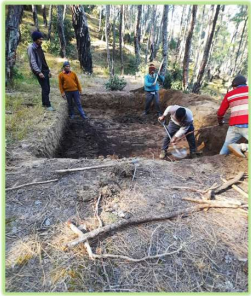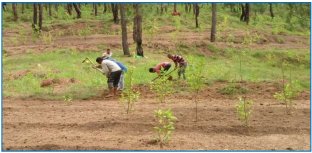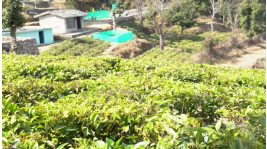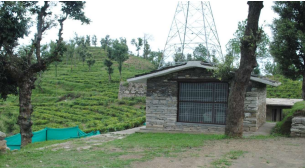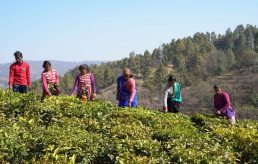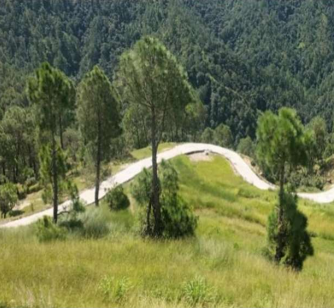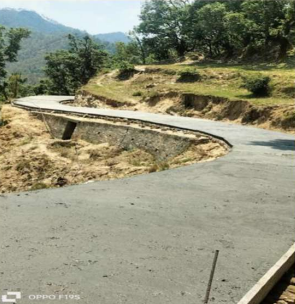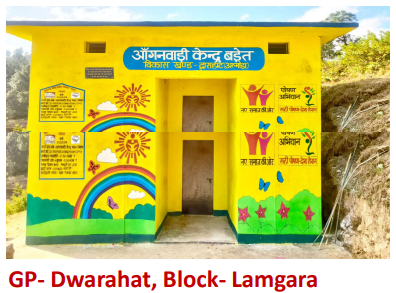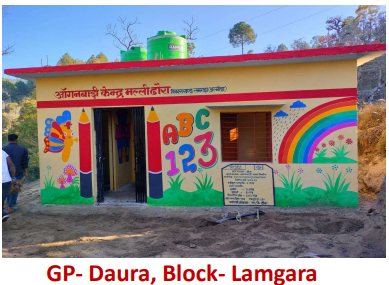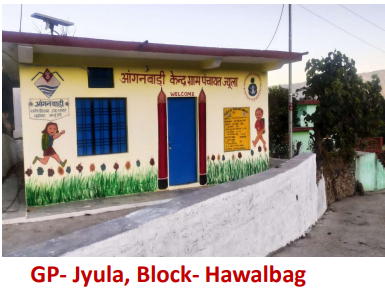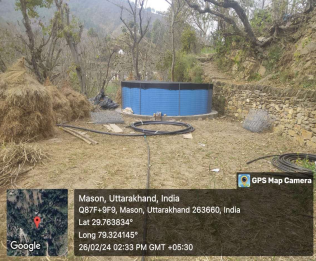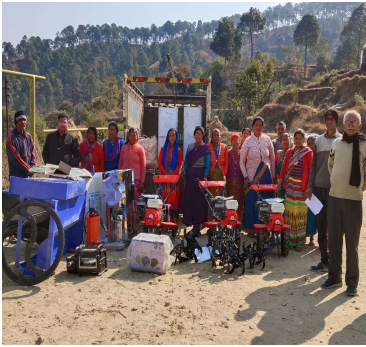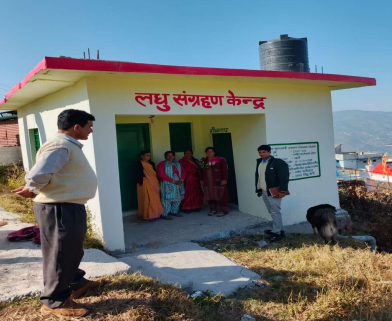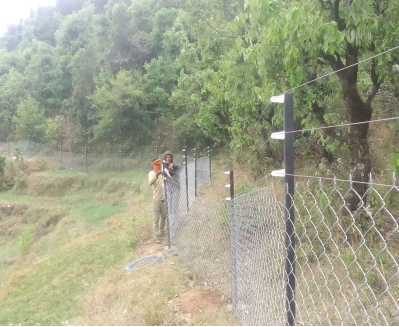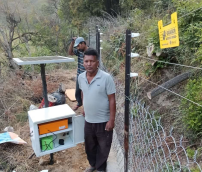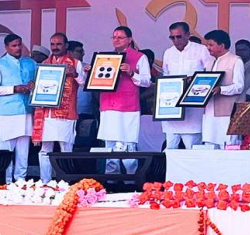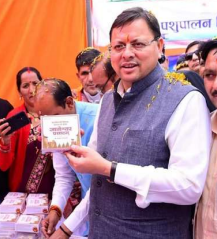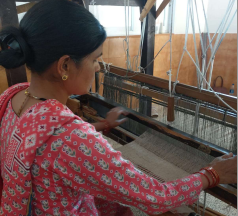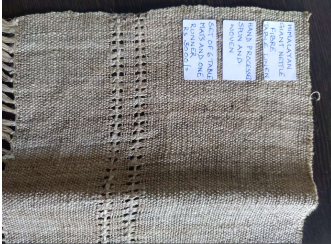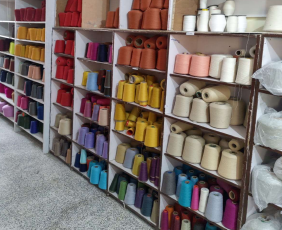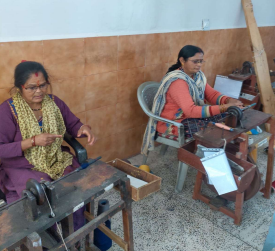Almora
Almora: A Hub of Empowerment and Sustainable Livelihoods
Almora district stands as a shining example of how rural development initiatives can empower communities and foster sustainable growth. Through various schemes like REAP and NRLM, women and local residents are achieving financial independence and improving their quality of life.
Best Practices (REAP)
- Floriculture
- Stitching Unit
- Pink e- Rickshaw
- Pink E-Rickshaw Initiative: This initiative in Almora empowers over 50 women as e-rickshaw drivers, providing safe and eco-friendly rides for women, girls, and the elderly. Drivers earn approximately ₹30,000 per month, fostering financial independence and reducing emissions by 30%.
- Visual Journey (Pink e- Rickshaw)
- Bhikiyasain Uniforms Stitching Unit: Established under the IFAD-REAP project by the Rural Development Department, Uttarakhand, this women-led stitching unit has become a successful livelihood initiative. In the last quarter alone, it achieved a business turnover of ₹8 lakh. The unit has secured school uniform orders and is actively expanding its client base, empowering rural women with skills, confidence, and sustainable income.
- Visual Journey (Stitching Unit)
- Floriculture (Lilium Oriental Cultivation): The Jai Maa Kalika SHG, supported by Gramothan-REAP Almora, has generated ₹9.6 lakh through the sale of 12,000 Lilium Oriental bulbs at ₹80 each. This initiative has directly benefited 20-25 women and inspired 40 more from village organizations to adopt Lilium farming, promoting sustainable rural livelihoods. An additional ₹7 lakh in sales is expected by the end of May, bringing the total projected revenue to around ₹16.6 lakh.
- Visual Journey (Floriculture)
Impacts of Ultrapoor Package (UGVS-REAP)
- Goat Farming: Shanti Devi from Syalsuna village received ₹35,000 under UGVS-REAP’s Ultrapoor package for goat farming. With additional convergence support of ₹35,000 from the Animal Husbandry Department and MNREGA, she received a total of ₹70,000, in addition to her own contribution of ₹5,868. She is projected to earn ₹5,000 monthly from selling new progeny after six months.
- Beauty Parlor: Babita Arya from Dugalkhola village, a member of Vikas CLF, received ₹35,000 under UGVS-REAP’s Ultrapoor package. With a financial linkage of ₹50,008 from the bank and her own contribution of ₹30,400, totaling ₹115,400, she established a beauty parlor. This venture adds approximately ₹4,300 to her monthly income and is expected to increase by 70% annually.
Best Practices (NRLM)
- Mushroom Cultivation: Four mushroom units have been established in the blocks of Hawalbagh, Lamgarha, and Bhikiyasain, benefiting 44 women with an annual income of ₹35,000 to ₹38,000. These 44 women are producing mushrooms using 2,400 bags.
- Beekeeping (Madhuvalley): Madhuvalley, a beekeeping initiative in Kanalkhunga, Hawalbagh block, is benefiting 45 women.
- Catering Services: Thirty women associated with NRLM are undertaking catering work, improving their livelihoods.
- Spice Unit: A spice unit in Bhikiyasain block benefits 40 women, with each earning a monthly income of ₹5,000.
- Rosemary Plantation: Under the CAP initiative, Rosemary saplings have been planted on 1 hectare of land in Singal and Dhamera Gram Panchayats of Bhikiyasain block, benefiting 22 women from self-help groups.
- Polyhouse Farming: 58 polyhouses have been installed through the Horticulture Department, following a cluster approach.
- Himanya Outlets: Two “Pahadi” Himanya outlets have been established in Almora’s main market. The Khapariyadi Village Organization in Hawalbagh block started with ₹80,000 from CIF in FY 2023-24. To date, they have achieved a total business of ₹4.50 lakh, involving 8 women. In the last six months, they achieved a turnover of ₹1.50 lakh and earned a profit of ₹74,000. The two main market outlets, with a total cost of ₹5 lakh and involving 15 women, achieved a turnover of ₹5.50 lakh and a profit of ₹2.20 lakh in the last six months.
Best Practices (NREGA)
- Water Conservation Works: In FY 2024-25, 713 water conservation works were undertaken at a cost of ₹728.69 lakh, with an estimated water retention capacity of 1086.56 lakh liters. These works include 232,652 contour trenches, 156 dug-out ponds, 828 chal khals, 829 cemented check dams, 573 crate wire check dams, and 1783 check dams and afforestation works.
- NREGS Convergence with Tea Board: In FY 2024-25, tea plantation has been carried out on 270.00 hectares of land at various locations. The total cost is ₹216.77 lakh (₹130.04 lakh under board scheme and ₹86.73 lakh under MNREGA scheme).
- NREGS Convergence with Sericulture Department: Mulberry plantation has been done on 85 acres in clusters across Lamgarha, Bhaisiachhana, Hawalbagh, and Takula in FY 2024-25. The total cost is ₹27.16 lakh, benefiting 85 families. After three years of plantation, each farmer is expected to earn ₹15,000 to ₹20,000 annually.
- Road Construction under MGMS: Road construction from Mathuraram’s house to Manginuala Khawadhar in GP Harada Molkhi, Sult block, was completed in FY 2021-22, benefiting approximately 285 families. Construction of a CC motor road from Diyari Panchayat Ghar to Sagbada in GP Diyari, Bhaisiachhana block, was also completed in FY 2021-22, benefiting approximately 230 families.
- Anganwadi Centers: Several Anganwadi centers have been constructed/renovated, including in Daura (Lamgarha block), Jyula (Hawalbagh block), Badet (Dwarahat block), and Garkot Talla (Sult block).
Visual Journey (MPRY)
- Small Collection Center: A small collection center has been established in Pali with a cost of ₹5 lakh.
- Solar Chain Link Fencing: In village Mason, a solar chain link fencing project covering approximately 3 hectares with a length of 830 meters has been implemented.
Proposed Game Changer Schemes (FY 2025-26)
- Jageshwar Prasadam & Copper Insignia (REAP): Inaugurated by the Honorable CM, “Jageshwar Prasadam” is a sacred offering launched by the District Administration & Gramothan REAP. This initiative promotes local produce and supports local artisans, enhancing community livelihoods. The copper coin, featuring Golu Devta and Jageshwar Temple, reflects Almora’s rich heritage and supports local artistry.
- Himadri Revival: This scheme focuses on the growth, innovation, and empowerment of artisans in the Himadri Handloom sector. The short-term plan aims for self-sufficiency through white labeling and sustainable systems. The long-term vision is to evolve Himadri into a complete craft village, integrating Aipan, copper, ringal, and Pichora dyeing, offering immersive experiences and developing craft tourism at its Kasar campus.

